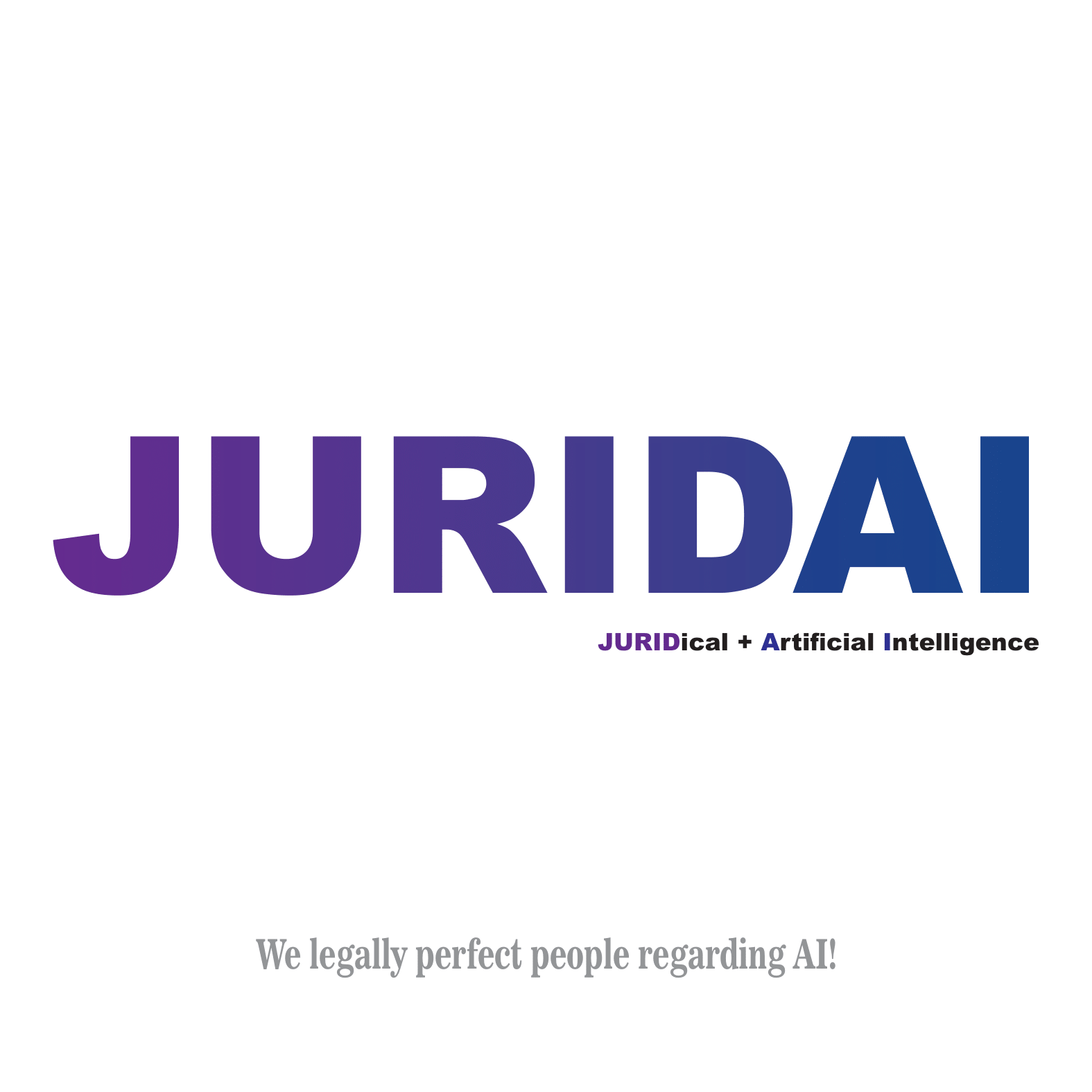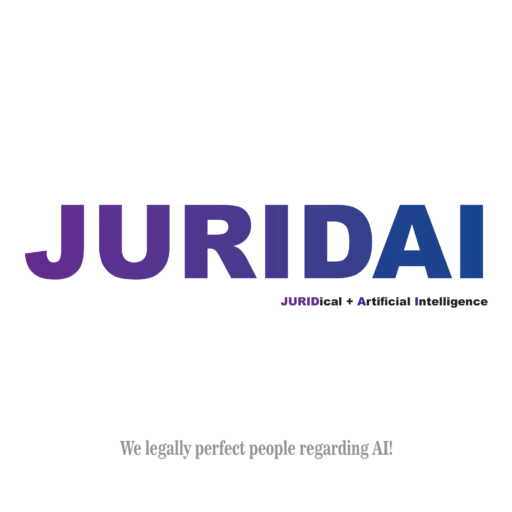Your team will be clear on how trustworthy/accountable/reliable/diligent/compliant AI exists!
We Teach How Responsible AI Exists! How AI Governance Exists Validly! With Us, Organizations Know How to Manage Legal Risks, Simplify Legal Complexities, and Prevent Legal Problems Regarding AI!
Relevance/Importance/Value: The organization’s team will know how to comply with any rule/norm/principle/law related to AI since they will know the general principles of law regarding AI, which clarifies how rights/duties exist concerning AI. They will understand how to govern AI (how AI governance exists validly)!

Course on General Principles of Law regarding Artificial Intelligence
For private or public sector Organizations so that their teams know what and how rights and duties exist in (apply to) AI
In-house training service on the general law principles regarding artificial intelligence (AI)
We Are Registered in Toronto, Ontario, Canada, Business Identification Number: 1000258746 – JURIDAI (JURIDical+AI=), General Law Principles Regarding AI, With us, AI Organizations know how rights and duties exist in AI
Value proposition:
The organizational trained team will learn the criteria on how to comply with the law before artificial intelligence (AI) thanks to the fact that the attendees will know the general principles of law regarding artificial intelligence (AI) since they are the ways that indicate how rights and duties exist concerning AI – Image.
The organization team does a simulation (under the trainer’s supervision) in the last part of the training. This activity includes filling out a JURIDAI table on the law principles we teach regarding AI so that the team knows how rights and duties apply to an imaginary AI System.
We do not create good but clarify its existence by explaining how the legal principles apply to AI. This shows how good AI is.
It is available for any private and/or public sector organization (located anywhere).
What legal principles regarding AI do we teach? The following general principles of law about AI: definition of law, legal validity, legal certainty, legal validity, legal diligence, legal compliance, good faith, responsibility, liability, recognition, protection, permission, prohibition, capability, possibility, enforcement, suitability, foreseeability, freedom, limitability, dignity, due process, judgment, reasonableness, justice, development, well-being, privacy, safety, trust, sustainability, transparency, explainability, communication, evolution, simplicity, risk management, rule of law, legality, legal system, legal order, legal categories, legal regime, quality, characterization, legal qualification, legal decipherment, systematization. contextualization, humanization, automatability, accuracy, consistency, truth, dispute resolution, coexistence, feasibility, completeness, purpose, non-profitability, profitability, care, creation, usability, control, maintenance, compatibility, actionability, harmonization, proactivity, anticipation, rest, continuity, interactivity, strategy, tactics, management, necessity, sufficiency, non-hierarchization, complementation, collaboration, solidarity, guarantee, goodness, stability, improvability, importance, meaning, focus, manageability, proficiency, self-sufficiency, articulation, coincidence, reality, theory, practice, solution, perfectibility, proofs, prudence, gradualness, innovation, creativity, accomplishment, universality, totality, uniqueness, means, results, principles, rules, norms, foundations, legal relationship, case, optimization, effectiveness, vitality, experience, exercise of rights and duties, good, clarity, equality, reference, organization, cleanliness, deproblematization, clarification, simplification, wisdom, pragmatism, achievability, and peace.
Through these principles, we explain/clarify/decipher what is the law and how to comply with what is defined in its whole regarding artificial intelligence (AI) to specify/show/teach/understand/know how rights and duties apply to AI.
Agenda:
- RESPONSIBLE AI: Introduction to the general principles of law and its relation to artificial intelligence (AI).
- AI GOVERNANCE: Explanation of the general principles of law regarding diligence, consent, quality, proofs, and responsibility concerning AI (harm mitigation/prevention, privacy, data protection/processing, risk management, transparency, explainability, accuracy, AI logistics, fair use, AI governance, responsible AI, safe AI, trustworthy AI, good/ethical AI, successful/effective/optimized AI).
- TRUSTWORTHY AI: Good practices to apply and make the general law principles effective regarding AI.
- AI RISK MANAGEMENT: Simulation/Role Play (under the trainer’s supervision) to apply the general principles of law in an imaginary situation related to AI explainability, risk management, and effectiveness, by filling out a JURIDAI table on the law principles we teach regarding AI so that the organization team knows how rights and duties apply to an imaginary AI System.
- ACCOUNTABLE AI: Final feedback emphasizing Compliance, Diligence, and Reliability.
Trainer: Prof. Dr. Camilo Alfonso Escobar Mora. Founder of JURIDAI (JURIDical+AI, teaching on the general principles of law regarding AI). He is certified as a Post-Doctor of Laws by the University of Bologna (Italy), Ph.D. in Law (recognized in Canada), LL.M. in Commercial Law, Master in Law and Information Technology, Master in Telecommunications Law, Lawyer, Researcher, Writer/Author, and Scholar in General Principles of Law regarding Artificial Intelligence (AI). Author of several books on the General Principles of Law/Legal Foundations/Legal Validity/Legal Diligence/Compliance with the Law/Rights and Duties Effectiveness/Legally Valid Quality of Life. Jury of the First Global Awards for Effective Advertising Self-Regulation organized by the International Council for Ad Self-Regulation (ICAS). Decipherer of the general principles of law regarding AI.
Material given to attendees and the contracting organization: presentation slides and recordings of the course sessions.
Platform: Google Meet or Zoom (the chosen platform and the access link are indicated to the attendees and the contracting organization before the start/beginning of the course).
Duration: 20 hours.
Date and Time (Schedule): Defined with the contracting organization.
Certificate: A certificate of course completion will be sent to the email account of the contracting organization. Each person attending all sessions will have a certificate of attendance forwarded to the same email account.
Final Price: 12,500 Canadian Dollars (CAD). PayPal payment button:
